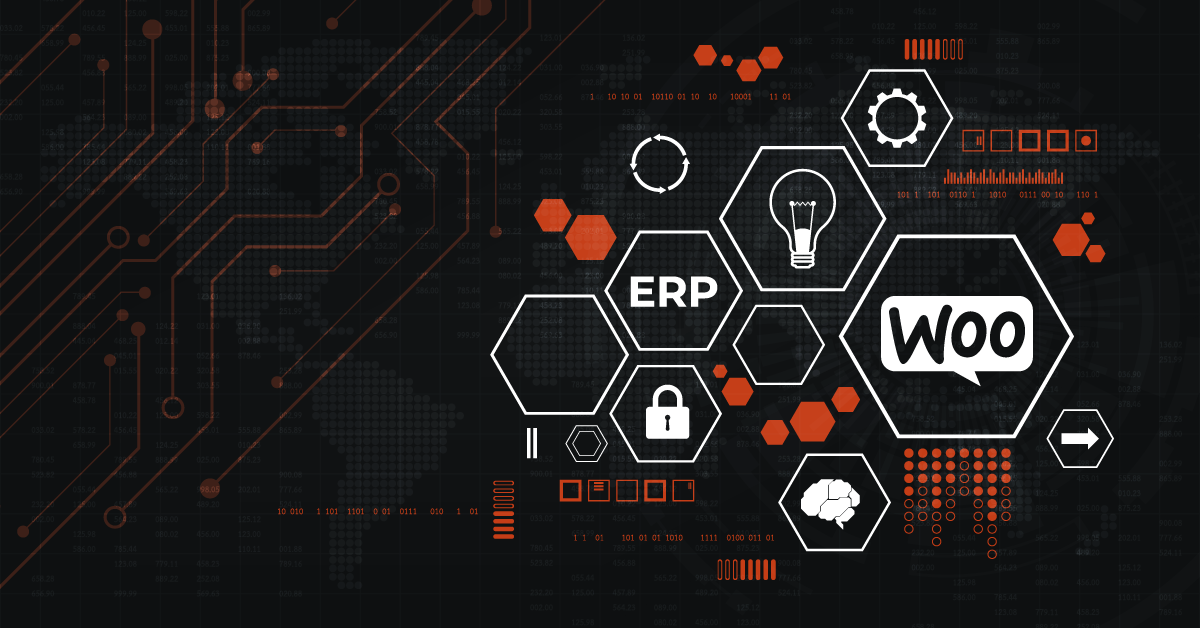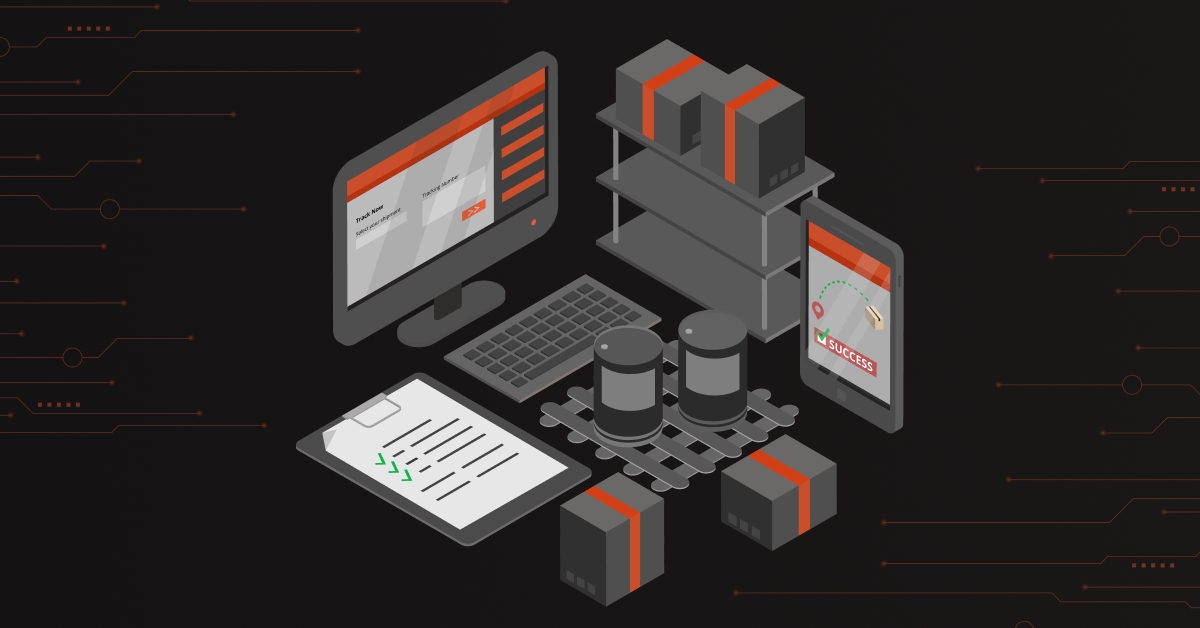ERP integration with WooCommerce is a game-changer for online businesses. WooCommerce is fantastic for selling stuff on the internet, but juggling inventory, orders, and data can be a real challenge. This is where ERP (Enterprise Resource Planning) systems step in, acting like the ultimate organizers. They bring all your data sources together, making your eCommerce business run smoother than ever.
Integrating your WooCommerce store with an ERP system can be a time-saver, an error-reducer, and a decision-maker. It’s like having a business sidekick that helps you make smarter choices.
Contents
How does WooCommerce Integrate with ERP
WooCommerce integrates with ERP systems like SAP Business One, Sage 200, and Microsoft Dynamics using REST APIs, which act as connectors for data exchange.
Connecting these systems can be done in two ways:
Custom Development: Hire a developer to create bespoke code for integration. Offers tailored features but can be expensive and reliant on the developer for maintenance.
Third-Party Provider: Outsource integration to a specialized provider, typically more cost-effective and adaptable to your business needs.
When WooCommerce connects to an ERP system, it streamlines processes, enabling real-time updates and eliminating manual data entry for tasks like syncing orders with accounting.
Related reads: ERP Integration with Shopify for Distributors [Methods & Challenges]
Why Integrate your ERP and WooCommerce?
With the eCommerce industry booming, many businesses are turning to WooCommerce as their go-to platform. As your business expands, your operations get more intricate. This is when WooCommerce ERP integration steps in.
ERP Integrations with WooCommerce offers a range of advantages for your business. Here are some of the key benefits:
1. Streamlined Operations: Integrating WooCommerce with an ERP system automates and streamlines key business processes like order management, supply chain management, inventory tracking, and financial reporting. This reduces manual work, minimizes silos, and boosts operational efficiency.
2. Real-Time Data: ERP integrations provide real-time data synchronization. This means you always have up-to-date information on inventory levels, sales, and user data, allowing for quicker decision-making.
3. Improved Customer Experience: With accurate, real-time data, you can better manage customer orders and provide faster, more reliable service. This leads to enhanced customer service and loyalty.
4. Scalability: As your business grows, ERP integrations can grow with you. They are adaptable to changes in product lines, sales volumes, and business expansion.
5. Data Accuracy: By reducing manual data entry and the risk of human error, integrations improve data accuracy. This leads to more reliable financial reporting and analytics.
6. Cost Savings: Automating manual tasks and reducing effort ultimately leads to cost and time savings. You can allocate resources more efficiently and reduce the need for labor-intensive processes.
7. Competitive Edge: A well-integrated system gives your business a competitive advantage. It allows you to respond quickly to market changes and customer demands, staying ahead of the competition.
8. Efficient Decision-Making: Access to real-time data and in-depth reporting empowers your business to make informed, data-driven decisions, which can be crucial in today’s fast-paced business environment.
Related reads: The Definitive Guide on ERP Integration with Salesforce
Top ERPs To Integrate With WooCommerce
Here are some of the best WooCommerce ERP integration software options available:
1. Odoo
Odoo is a highly flexible and open-source ERP system that seamlessly integrates with WooCommerce. It offers features like inventory management, sales, and CRM, making it a comprehensive choice for businesses of various sizes.
2. NetSuite
NetSuite ERP is a cloud-based solution known for its scalability. It provides a wide range of features, including financial management, CRM, and ecommerce. The integration ensures real-time data synchronization and centralized business processes.
3. Microsoft Dynamics 365 Business Central
This solution by Microsoft offers an all-in-one ERP and CRM system that can be easily integrated with WooCommerce. It provides powerful tools for financial management, inventory, and customer relationship management.
4. Infor Distribution SX
Infor Distribution SX is tailored for wholesale distributors. When integrated with WooCommerce, it streamlines order management, inventory tracking, and financial operations, helping businesses in the distribution industry.
5. SAP Business One
SAP Business One is an enterprise-level ERP solution suitable for small and mid-sized businesses. It integrates seamlessly with WooCommerce and offers modules for accounting, inventory management, and sales.
6. Acumatica
Acumatica is a cloud-based ERP solution that provides flexibility and scalability. Its integration with WooCommerce simplifies business operations by centralizing data, including financials, inventory, and customer information.
7. Sage 100 Integration
Sage 100 is widely used for accounting and financial management. When combined with WooCommerce, it ensures efficient synchronization of ecommerce transactions with back-end operations.
Connecting Your ERP and eCommerce Store with DCKAP Integrator
If you’re seeking a streamlined solution for integrating your eCommerce store with your ERP system, DCKAP Integrator is the best choice.
Checkout the case study below that illustrates the success story of Walker Zanger, a luxury stone and tile company, as they integrate their eCommerce store with a popular ERP, Epicor Prophet 21 (EP21):
- Automated Integration: DCKAP Integrator was pivotal in automating the integration between WooCommerce and EP21 for Walker Zanger. This automation allowed them to focus on their core business activities while data synchronization was seamlessly managed.
- Scalability and Security: The integration of WooCommerce with EP21 required robust security and scalability. DCKAP Integrator ensured that the data exchange was secure, and it could adapt to the growing needs of Walker Zanger’s business.
- Customization: Every business has unique requirements. Walker Zanger needed a solution that could accommodate their specific needs, including customer pricing and product image integration. DCKAP Integrator’s flexibility allowed for tailoring the integration to align with their business rules.
- User-Friendly Dashboard: Walker Zanger benefited from a user-friendly dashboard provided by DCKAP Integrator. This dashboard gave them a comprehensive view of API calls, success rates, and more. It enhanced transaction security and reduced errors and inefficiencies.
- Flexible Scheduler: Integration timing was critical for Walker Zanger. They needed both real-time and scheduled data communication, especially for inventory and new product catalog updates. DCKAP Integrator met these timing requirements effectively.
- Role Management: Data security was paramount for Walker Zanger, and DCKAP Integrator offered a customized role management module. This ensured data security without hindering information flow, a key consideration when managing access across teams and departments.
- Reporting and Analytics: The integration allowed for better reporting capabilities, enabling Walker Zanger to gain insights into project performance, connector activities, and transactions. DCKAP Integrator’s reporting and analytics module played a crucial role in this.
- Alerts and Notifications: Keeping stakeholders informed was vital for Walker Zanger. DCKAP Integrator facilitated custom notifications based on user roles, ensuring everyone was kept up to date with key project events.
- Secure Transactions: Security was a top priority for Walker Zanger, and DCKAP Integrator’s SSL certification and GDPR compliance ensured the privacy and security of customer data during transactions.
- Developer-Independent: Walker Zanger, like many businesses, didn’t want to be dependent on developers for every adjustment. DCKAP Integrator’s low-code or no-code platform allowed them to customize and operate the integration without the need for coding expertise.
The Walker Zanger case study shows how the DCKAP Integration platform streamlines the integration of WooCommerce with EP21, offering automation, security, and customization. If you seek an efficient, secure, and adaptable solution for your ERP integration, DCKAP Integrator is the answer.
Discover the power of DCKAP Integrator and take your business processes to new heights. Sign up for a demo today and witness the transformation firsthand!
FAQS
What is WooCommerce?
WooCommerce is a free, open-source WordPress plugin that transforms a WordPress website into a fully functional ecommerce platform. It provides essential features for creating and managing online stores, including product listings, shopping carts, secure payment processing, and order management.
Is WooCommerce only for WordPress websites?
Yes, WooCommerce is specifically designed to work with WordPress. It integrates seamlessly with WordPress, enabling users to add ecommerce capabilities to their existing WordPress websites or build new online stores.
Are WooCommerce extensions free or paid?
WooCommerce offers both free and paid extensions. The availability of free extensions can vary, and more advanced features often come with a price tag. You can choose the extensions that best suit your store’s needs and budget.
What is ERP Integration with WooCommerce?
ERP Integration with WooCommerce refers to the process of connecting an Enterprise Resource Planning (ERP) system with the WooCommerce ecommerce platform. This integration streamlines various business operations by allowing data to flow seamlessly between these two systems.
What Are the Key Benefits of ERP Integration with WooCommerce?
The benefits include improved data accuracy, time savings, enhanced customer service, better decision-making, and the ability to handle increased business complexity.
What is WP ERP?
WP ERP is a comprehensive Enterprise Resource Planning (ERP) system designed as a WordPress plugin. It offers a suite of business management tools integrated into the WordPress platform. These tools include Customer Relationship Management (CRM), Human Resource Management (HRM), and accounting modules.
Why is WP ERP used in ERP Integration WooCommerce?
WP ERP is used in WooCommerce ERP Integration because it offers a unified, user-friendly, and integrated solution for managing various aspects of a business. This makes it easier to oversee and optimize operations while utilizing the WooCommerce ecommerce platform.
How can I access WooCommerce order details?
WooCommerce customers can access order details by logging into your WooCommerce dashboard, navigating to the “Orders” section, and clicking on a specific order. This will provide you with a detailed view of the order, including customer information, products, and order status.
Is WP ERP CRM suitable for small businesses?
Yes, WP ERP CRM is designed to cater to businesses of all sizes, including small businesses. It offers scalable solutions that can be customized to fit the specific needs and budgets of smaller enterprises.
What role do apps play in WooCommerce ERP integration?
Apps, or software applications, can enhance the functionality of WooCommerce ERP integration. They are used to bridge the gap between WooCommerce and ERP systems, ensuring seamless data flow and providing additional features like real-time synchronization, customization, and reporting.
How does the ERP integration with WooCommerce contribute to having a “single source of truth” for business data?
WooCommerce ERP integration ensures that critical business data, including product data, customer information, sales orders, and inventory, is consistently updated and synchronized between the two systems. This synchronization creates a “single source of truth,” where data is consistent and accurate across all operations.
How does WooCommerce ERP integration benefit business applications and processes?
WooCommerce ERP integration enhances business applications and processes by providing real-time data synchronization between WooCommerce and the ERP system. This enables businesses to operate more efficiently, make important decisions, and improve overall productivity.




